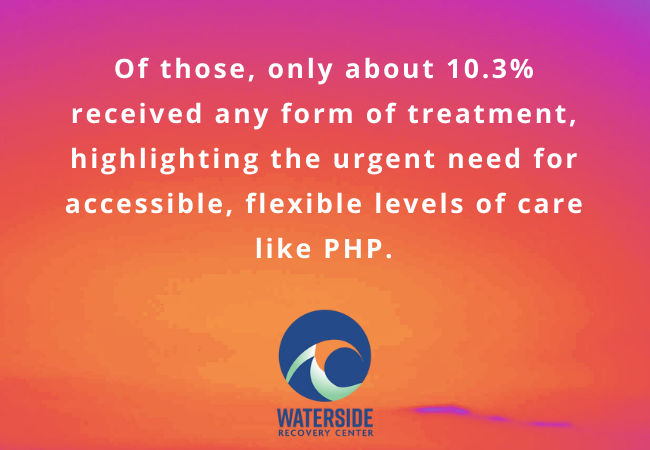Choosing the right level of care in addiction and mental health recovery is not always straightforward. Each person’s situation is different—defined by personal history, severity of symptoms, available support systems, and practical life responsibilities. A Day Treatment Program can be the bridge between inpatient care and full independence. But how can you tell if this level of care truly suits your recovery journey?
Whether you’re newly considering treatment or transitioning from a more intensive setting, this blog will help you assess your needs and understand whether day treatment offers the balance and structure necessary for lasting progress.
Understanding the Basics of Day Treatment
Day treatment offers a structured, immersive therapy experience during daytime hours, allowing individuals to return home at night. This format provides consistency and clinical intensity while preserving autonomy—a model especially beneficial to those managing work, school, or family obligations.
The design of day treatment helps individuals remain connected to everyday life while still receiving the therapeutic support they need. It’s not a casual or light level of care—participants are engaged in full-time therapeutic work across multiple hours per day, multiple days per week.
A program of this nature includes individual therapy, group counseling, medication support if needed, educational sessions, and skills development. This combination of clinical treatment and real-life application is particularly helpful for people in the early stages of recovery or those stepping down from more restrictive programs.
Who Should Consider Day Treatment?
Day treatment is most effective for individuals who need more support than weekly counseling but do not require 24/7 supervision. If you’re experiencing moderate symptoms, facing complex mental health challenges, or require a stable daily routine to avoid relapse, this level of care may be ideal.
Those with co-occurring disorders benefit greatly from this kind of structure. It also suits individuals who recently completed detox or inpatient care and are looking to sustain their momentum in recovery. The flexibility of returning home at the end of the day allows participants to start practicing the skills they’re learning in therapy—applying them in real-time within their daily environments.
It’s also a great fit for individuals who have dependable transportation, supportive family or friends, and a safe home environment that aligns with recovery goals.
How Day Treatment Compares to Other Care Levels
Many people aren’t sure whether to begin with day treatment or pursue something more intensive. It’s helpful to understand how day treatment fits into the broader continuum of care.
Inpatient care is the most intensive form of treatment. It provides 24-hour supervision and support and is often necessary for individuals in crisis, at risk of self-harm, or facing severe withdrawal symptoms. After stabilization in an inpatient setting, stepping down to day treatment can provide ongoing support without the full-time residential requirement.
Intensive outpatient care (IOP) is a step below day treatment, offering fewer therapy hours per week. This option is suited for individuals who are further along in their recovery and can function with less daily oversight. Outpatient therapy, the least intensive, includes weekly or bi-weekly counseling appointments—ideal for maintenance and long-term recovery once stability has been reached.
A Partial Hospitalization Program in Massachusetts closely mirrors the structure and goals of a day treatment approach, often overlapping in services and intensity. Both allow individuals to receive structured care during the day and return home in the evenings, bridging the gap between full hospitalization and traditional outpatient services.
Exploring Therapeutic Approaches and Daily Routines
In day treatment, a blend of therapy models is used to promote healing on emotional, behavioral, and psychological levels. Participants may engage in evidence-based therapies like cognitive-behavioral therapy (CBT), dialectical-behavioral therapy (DBT), and trauma-informed practices.
Days are typically broken into blocks of individual therapy, group discussions, psychoeducation, skill-building workshops, and sometimes wellness activities like mindfulness or art therapy. This consistency helps individuals establish routines, manage their time, and feel a sense of accomplishment—all of which are crucial for long-term recovery.
Professionally led groups foster accountability and connection, which helps combat the isolation often felt in addiction or mental health challenges. These shared experiences build a sense of belonging, mutual understanding, and emotional support.
For those with daytime commitments, an Afternoon Treatment Program in Massachusetts may provide the flexibility to receive intensive therapy in the latter half of the day, without disrupting job duties or caregiving responsibilities.
Real-Life Application of Recovery Tools
The real power of a day treatment approach lies in how it blends clinical therapy with real-world practice. Individuals are not just learning about coping strategies—they’re using them immediately after treatment hours end. They go home, manage stressors, navigate social situations, and return the next day to process those experiences with support.
This model allows for continual adjustment, reinforcement, and accountability. Therapists and counselors can tailor interventions based on what’s working—and what’s not—in the individual’s daily life. It also strengthens relapse prevention, as clients are actively identifying triggers and building healthier responses in real time.
Participants in an Outpatient Treatment Program in Massachusetts often report improved confidence, emotional regulation, and communication skills. Over time, this leads to more fulfilling relationships, stronger boundaries, and increased resilience.
While many recovery paths begin in crisis, healing itself is a day-by-day process. Success depends not only on internal motivation but also on whether someone has the tools, structure, and support to manage life’s daily stressors. A therapeutic environment rooted in trust, empathy, and clinical expertise allows individuals to explore their pain, face their fears, and begin writing a new narrative.
The transition into a stable life isn’t about a single breakthrough moment. It’s a layered process of showing up, doing the work, and reconnecting with self-worth. The combination of guided therapy and personal responsibility cultivated in day treatment offers a solid foundation for this journey. Being able to talk through real experiences, reflect, and apply new insights in a supportive setting creates momentum that’s hard to replicate in less structured environments.
This level of care is particularly valuable for people who are navigating both substance use and underlying emotional struggles. In fact, many Addiction Therapy Programs in Massachusetts are tailored to help individuals understand the connection between their mental health and substance use patterns. Recognizing those links is critical for meaningful recovery—not just from addiction, but from the shame and guilt that often accompany it.
Clients also benefit from peer support that grows organically in these programs. Hearing others share their progress and struggles fosters a sense of camaraderie, while also reinforcing the truth that no one is alone in this process.
Why Choose Waterside Recovery Center?
When it comes to recovery, the environment where healing takes place can make a world of difference. At Waterside Recovery Center, we provide a structured and compassionate space where clients feel supported and empowered. Our team is committed to helping each individual not just get better—but thrive in long-term recovery.
As a trusted Addiction Treatment Center Massachusetts residents can rely on, we offer comprehensive, individualized care through every phase of the healing process. Our day treatment program combines evidence-based therapies, holistic practices, and personalized attention to meet the full spectrum of recovery needs.
Conclusion
Determining whether day treatment is the right level of care isn’t always simple. It requires honest reflection, careful assessment, and often, guidance from professionals. But with the right support system, a structured environment, and a treatment plan tailored to your life, you can move forward with confidence.
Call us today at 866.671.8620 to learn more. Recovery isn’t about perfection—it’s about progress. And a day treatment program might be the structure you need to build that progress into lasting transformation.
Frequently Asked Questions (FAQs)
What is the difference between day treatment and inpatient treatment?
Day treatment allows individuals to receive structured therapy during the day and return home each evening. In contrast, inpatient treatment requires clients to live at the facility full-time, offering 24/7 supervision and support.
Who benefits most from a day treatment program?
Day treatment is ideal for individuals who need intensive support but also have a stable home environment and responsibilities they cannot step away from completely, such as work or family care.
Can I continue working while in day treatment?
Some individuals continue working part-time or adjust their schedules around treatment hours. Afternoon or evening options may help balance work and therapy commitments more effectively.
What therapies are included in day treatment programs?
Day treatment often includes individual therapy, group counseling, cognitive-behavioral therapy (CBT), medication management, and holistic approaches such as mindfulness or art therapy.
How long does a day treatment program usually last?
Programs vary by individual needs but typically range from a few weeks to several months, with participants attending multiple sessions per week for several hours per day.
What happens after completing a day treatment program?
After completing day treatment, many individuals transition into less intensive options such as intensive outpatient programs (IOP) or traditional outpatient therapy for continued support.
How do I know if I need more than outpatient therapy?
If you’re struggling to maintain sobriety or manage mental health symptoms despite attending weekly therapy, a more structured program like day treatment may provide the additional support you need.



